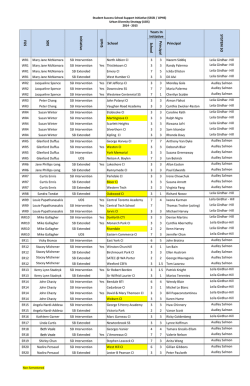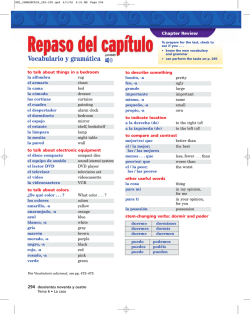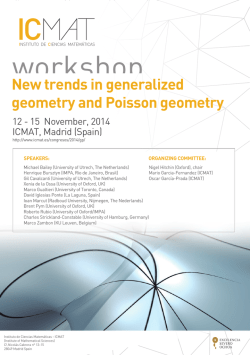
Socioscientific Issues in Science Education
Socioscientific Issues in Science Education An introductory note José-Antonio Acevedo-Díaz Huelva-Spain 2015 Socioscientific Issues in Science Education Socio-scientific issues (SSI) are controversial social issues with conceptual and procedural relating to science and technology. They are open-ended problems without clear-cut solutions; in fact, they tend to have multiple plausible solutions (Sadler, 2004). The ability to negotiate and resolve controversial technoscientific issues with social interest –Socio-scientific Issues (SSI) in science education– is currently considered an essential component of scientific and technological literacy for all (Sadler, 2011). The inclusion of SSI in the science curriculum offers a means of expanding both the curriculum and the range of instructional practices commonly experienced in the school science classroom. SSI are used to engage students with science related issues that allows them to integrate science in daily life issues. The educative aim of citizenship education through science education converges to the declared purpose of the SSI movement. Socioscientific Issues in Science Education The relationship between science education and values education –or rather the education for assessing– is manifested more strongly in controversies about SSI. From this perspective, values education should focus on the problems of the world today. Thus, science education should incorporate competences for negotiating and resolving controversies about SSI (Acevedo, 2006; Kolstø, 2001; Reis, 2004). Use of SSI in science education is a powerful resource to promote scientific and technological literacy (Acevedo et al., 2005; Kolstø and Mestad, 2005), especially when appropriate treatment methodologies are used in the classroom (García-Carmona, 2006; Kolstø, 2000; Martín-Gordillo, 2005; Martín-Gordillo and Osorio, 2003; Reis and Galvão, 2008; Sadler, 2011). In this way, it contributes to promote the citizen participation to make decision about technoscientific issues, favoring the dissemination of scientific and technological culture. Socioscientific Issues in Science Education Teaching of SSI places uncertainty and risk at the core of science teaching. These issues are controversial and lead to debates on the production of scientific knowledge. Generally, people not have the tendency to utilize multiple perspectives to analyze the SSI for themselves. Likewise, they are more likely to critique the credibility of sources related to information they disagreed with. Non-epistemic factors (cultural, social, political, ethical and religious beliefs, emotions and feelings, interests, values and rules…) are in the base of reasoning, arguments, and decisions that people take when facing to SSI. Epistemic elements (scientific knowledge and epistemology of science) are clearly insufficient. Factors influencing decisions on SSI Moral reasoning, ethics, values and norms Scientific and NOS knowledge Decision making on SSI Cultural, social and political beliefs Emotions and feelings Socioscientific Issues in Science Education The SSI movement has built upon other approaches that share the goal of better preparing learners to engage in discourses and decisions related to socially relevant issues associated with science. The most notable of these approaches is the tradition ScienceTechnology-Society (STS) for Science Education, promoting a more humanistic science education (Vázquez, Acevedo and Manassero, 2005; Vesterin, Manassero-Mas and Vázquez-Alonso, 2014). Other approaches such as Science-Technology-Society-Environment (STSE), Education for Sustainability, and context-based Science Education also have many features in common with the SSI approach (Sadler, 2011; Zeidler et al., 2005). References Acevedo, J. A. (2006). Relevancia de los factores no-epistémicos en la percepción pública de los asuntos tecnocientíficos. Revista Eureka sobre Enseñanza y Divulgación de las Ciencias, 3(3), 369390. Acevedo, J. Acevedo, P., de la ciencia Una revisión A., Vázquez, A., Martín-Gordillo, M., Oliva, J. M., Paixão, M. F. & Manassero, M. A. (2005). Naturaleza y educación científica para la participación ciudadana. crítica. Revista Eureka sobre Enseñanza y Divulgación de las Ciencias, 2(2), 121-140. García-Carmona, A. (2006). Interacciones CTS en el aprendizaje del electro-magnetismo: una experiencia para el desarrollo de actitudes de responsabilidad. Investigación en la Escuela, 58, 7991. Kolstø, S. D. (2000). Consensus projects: Teaching science for citizenship. International Journal of Science Education, 22(6), 645664. References Kolstø, S. D. (2001). Scientific Literacy for Citizenship: Tools for Dealing with the Science Dimension of Controversial Socioscientific Issues. Science Education, 85(3), 291-310. Kolstø, S. D. & Mestad, I. (2005). Learning about the nature of scientific knowledge: the imitating science project. In K. Boersma, M. Goedhart, O. de Jong & H. Eijkelhof (Eds.), Research and the Quality of Science Education (pp. 247-257). Dordrecht, The Netherlands: Springer. Martín-Gordillo, M. (2005). Las decisiones científicas y la participación ciudadana. Un caso CTS sobre investigación biomédica. Revista Eureka sobre Enseñanza y Divulgación de las Ciencias, 2(1), 38-55. Martín-Gordillo, M. & Osorio, C. (2003). Educar para participar en ciencia y tecnología. Un proyecto para la difusión de la cultura científica. Revista Iberoamericana de Educación, 32, 165-210. References Reis, P. (2004). Controvérsias sócio-científicas: Discutir ou não discutir? Percursos de aprendizagem na disciplina de Ciências da Terra e da Vida. Tese de Doutoramento em Didáctica das Ciências, Universidade de Lisboa, Faculdade de Ciências, Departamento de Educação. Reis, P. & Galvão, C. (2008). Os professores de Ciências Naturais e a discussão de controvérsias sociocientíficas: dois casos distintos. Revista Electrónica de Enseñanza de las Ciencias, 7(3), 746-772. Sadler, T. D. (2004). Informal reasoning regarding socioscientific issues: A critical review of research. Journal of Research in Science Teaching, 41(5), 513- 536. Sadler, T. D. (2011). Situating socio-scientific issues in classrooms as a means of achieving goals of Science education. In T. D. Sadler (Ed.), Socio-scientific issues in classrooms. Teaching, learning and research (pp. 1-9). Dordrecht, The Netherlands: Springer. References Vázquez, A., Acevedo, J. A. & Manassero, M. A. (2005). Más allá de una enseñanza de las ciencias para científicos: hacia una educación científica humanística. Revista Electrónica de Enseñanza de las Ciencias, 4(2). Vesterinen, V.-M., Manassero-Mas, M. A. & Vázquez-Alonso, A. (2014). History, Philosophy, and Sociology of Science and ScienceTechnology-Society Traditions in Science Education: Continuities and Discontinuities. In M. Matthews (Ed.), International handbook of research in history, philosophy and science teaching (pp. 18951925). Dordrecht: Springer. Zeidler, D. L., Sadler, T. D., Simmons, M. L. & Howes, E. V. (2005). Beyond STS: A research-based framework for socioscientific issues education. Science Education, 89(3), 357-377. Teaching materials for scientific culture OEI - Organización de Estados Iberoamericanos para la Educación, la Ciencia y la Cultura Containers Iberciencia, on-line http://ibercienciaoei.org/contenedores/index.php http://ibercienciaoei.org/contenedores/descripcion.php
© Copyright 2026



